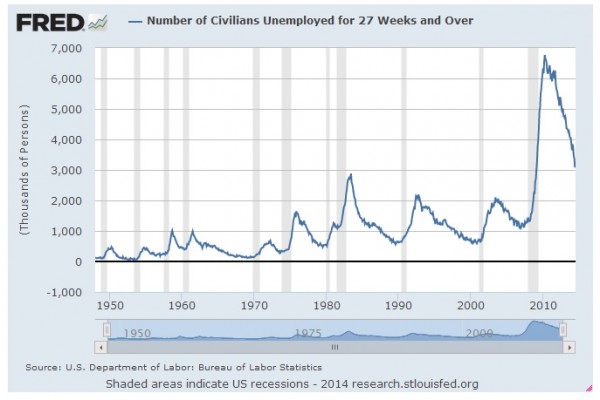It is conventional wisdom on the right that extending the period of time people are eligible for unemployment insurance (UI) just keeps them from looking for jobs. They stay on UI as long as you let them, and once UI runs out they go look for jobs. The evidence adduced for this is that unemployment rates among UI recipients go down significantly right after the benefits are cut off – regardless of when you cut off the benefits.
So my eyebrows were raised by this post from James Pethokoukis arguing that cutting off UI does not really get people back into jobs. He looks at evidence that the UI recipients disappear from the ranks of the “unemployed” after benefits are cut off, not because they found jobs, but because they gave up looking for work. Transitions from unemployment to jobs appear to be unaffected one way or the other by UI. What is affected by UI is the transition from claiming that you are looking for work (which you must, to be eligible for UI) to admitting you’re not.
To the extent that this evidence is reliable (I’m not qualified to judge) it certainly tells against the idea that we can promote work by yanking UI benefits. On the other hand, I’m not sure this is evidence we should extend UI benefits, either. Pethokoukis seems to think so, but on his own showing, there would seem to be a substantial number of people who are only on UI to milk it as long as they can. Does it make any sense to pay people to claim they’re looking for work if they’re not?
The real takeaway, in my mind, is that the solution to joblessness has nothing to do with safety net programs one way or the other. In the short term, we need to cultivate and encourage entrepreneurs; in the long term, we need universal school choice to revolutionize the education system. Let’s set a fixed term for UI and not monkey around with it, so we can focus our attention and energy on clearing away the obstacles to work.
